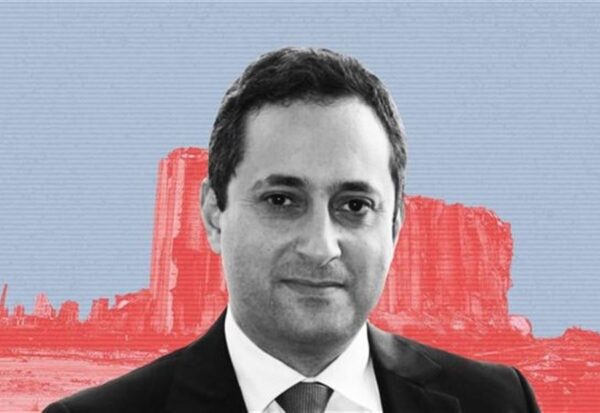File: Judge Tarek Bitar was appointed lead investigator into the Beirut Port blast ( background ) after the removal of his predecessor Judge Fadi Sawwan in February 2021. The background of Bitar’s picture shows the huge silos of Beirut Port following the explosion on Aug.4, 2020 in which over 220 people were killed,7000 were injured and 300, 000 became homeless after hundreds of tons of ammonium nitrate exploded. 2750 tons were stored there illegally for nearly 7 years, reportedly for use by the Syrian regime in its barrel bombs. Former President Michel Aoun and former PM Hassan Diab were informed about the explosive chemical 2 weeks before the explosion, but did nothing about it. Hezbollah and its allies successfully blocked the investigation and campaigned for years to get the courageous judge fired from his position, like they did to his predecessor, Judge Sawwan
Beirut- The Lebanese judge investigating the massive 2020 Beirut port explosion questioned two former security chiefs on Friday, including former General Security chief Abbas Ibrahim, who appeared in court for the first time since being summoned nearly four years ago, according to four judicial and two security officials.
The officials spoke on condition of anonymity because they were not authorized to brief the media. The hearings mark a rare breakthrough in the long-stalled probe.
Ibrahim and former head of State Security Maj. Gen. Tony Saliba are among several officials charged in connection with the blast that killed over 220 people, injured 7000 and left 300,000 homeless. The specific charges have not been disclosed.
Ibrahim appeared in court for the first time, where Judge Tarek Bitar questioned him about the operations of the General Security Directorate during his tenure and requested related documents, which Ibrahim’s lawyer is expected to submit next week.
Ibrahim, who headed the General Security Directorate between 2011 and 2023, is known for wide connections with local, regional and international figures, including Iran-backed Hezbollah, the former Syrian government and Western nations, making him a key political mediator.
Ibrahim’s attorneys said in a statement that the former General Security chief appeared in court despite having previously filed a legal challenge against Judge Bitar and despite claiming that he was immune from prosecution.
His attorneys said he appeared as a “mark of respect for the families of the martyrs and victims, his belief in justice and truth, and his commitment to upholding legal procedures and the course of justice.”
Saliba, appearing in court for the fourth time, cooperated with the hearing, providing documentation pertaining to his role at State Security. After the hearing, Saliba described the proceedings as “positive” in a statement.
On Aug. 4, 2020, hundreds of tons of ammonium nitrate detonated in a Beirut Port warehouse which devastated large swaths of the capital. The blast, one of the largest non-nuclear explosions in history, caused billions of dollars in damage and sent shockwaves through the nation’s capital.
Following years of political obstruction by Hezbollah, Bitar resumed the stalled investigation in mid-January, questioning port and customs employees, retired military officials, the former head of port security, the former army intelligence director, and 12 witnesses.
This development coincides with significant political changes in Lebanon, including the election of Joseph Aoun as president and the appointment of Nawaf Salam as prime minister. Both are perceived as outside the traditional political establishment, which includes many figures charged in the port explosion case.
Several officials implicated in the investigation have accused Bitar of bias, refused to testify, and filed legal complaints against him.
Next week, Bitar is expected to question top former political leaders. Former Prime Minister Hassan Diab, who was informed about the presence of the ammonium nitrate two weeks before the explosion, but did nothing about it . He is scheduled to appear in court in May. His hearing will be followed by the questioning of four judges.
Meanwhile, a French delegation is expected to submit their findings from their investigation into the explosion later in April. France initiated its own probe into the explosion in 2020 after three French nationals were killed in the blast. However, French judges have faced obstacles in accessing documents from the Lebanese investigation, which has been hindered by political interference.
Many in Lebanon are calling on Judge Bitar to also question Hezbollah’s top ally, former president Michel Aoun, who, like Diab, was told about the 2750 tons of ammonium nitrate that were illegally stored at the port and, like Diab , didn’t do anything about it.
Abbas Ibrahim was the first Lebanese official to disclose the fact that the explosion was caused by the ammonium nitrate and not the firecrackers that were also stored in the same warehouse . Analysts have been saying that he knew all along about the presence of the ammonium nitrate, being the top Security official at the time.
Critics argue that Ibrahim owes his clout to the support he has from the Iranian-backed Hezbollah militant group.
Major General Abbas Ibrahim forged a strong and trusting relationship with the powerful Shiite group when he was the army intelligence chief for the south of the country.
AP/ YL

